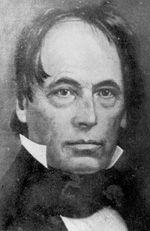Jared W. Williams
Jared Warner Williams (born December 22, 1796 in West Woodstock , Windham County , Connecticut , † September 29, 1864 in Lancaster , New Hampshire ) was an American politician and governor of the state of New Hampshire from 1847 to 1849 . He also represented his state in both houses of the US Congress .
Early years and political advancement
Jared Williams attended Brown University in Providence ( Rhode Island ) until 1818 . After studying law at Litchfield Law School and his admission as a lawyer in 1822, he began to practice in Lancaster in his new profession. Between 1830 and 1831 and again from 1835 to 1836 he was a member of the New Hampshire House of Representatives . In between he was a member of the State Senate from 1832 to 1834 . Williams was a member of the Democratic Party and served two terms in the US House of Representatives between March 4, 1837 and March 3, 1841 .
New Hampshire Governor and US Senator
In 1846, Williams had narrowly failed in the gubernatorial election. A year later he was elected the new governor of his state. After re-election in 1848, he was able to serve between June 3, 1847 and June 7, 1849. During his tenure, the state's militia was reformed and a new divorce law was discussed against the backdrop of religious disputes. It was also during this period that property rights were re-regulated by law. Governor Williams supported the federal government during the Mexican-American War . However, there was strong opposition to this war in New Hampshire. After his tenure ended, Williams served as a probate judge in Coos County in 1852 .
After the death of US Senator Charles G. Atherton on November 29, 1853, Williams was appointed as his interim successor as a Class 2 Senator . Williams resigned on August 4, 1854. On March 4, 1855, John P. Hale became his elected successor.
Another résumé
After returning from Washington, Williams gradually withdrew from politics. In the year of his death in 1864, he was once again a delegate to the Democratic National Convention in Chicago . He died on September 29 of the same year and was buried in Lancaster. He had two children with his wife, Sarah Hawes Bacon.
Web links
- Jared Williams at the National Governors Association (English)
- Biography of New Hampshire (English)
- Jared W. Williams in the Biographical Directory of the United States Congress (English)
- Jared W. Williams in the database of Find a Grave (English)
| personal data | |
|---|---|
| SURNAME | Williams, Jared W. |
| ALTERNATIVE NAMES | Williams, Jared Warner (full name) |
| BRIEF DESCRIPTION | American politician |
| DATE OF BIRTH | December 22, 1796 |
| PLACE OF BIRTH | West Woodstock , Connecticut |
| DATE OF DEATH | September 29, 1864 |
| Place of death | Lancaster , New Hampshire |



